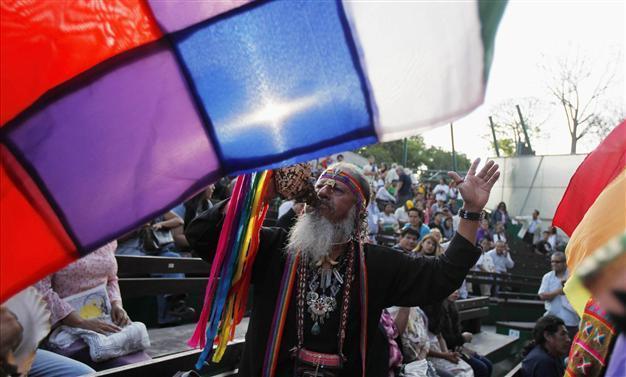EU presses for accountability, opening rift at UN climate talks
LIMA - Reuters

An indigenous man blows a traditional instrument known as 'pututu' during the inauguration of the People's Summit, an alternative event held concurrently to UN Climate Change Conference COP 20, in Lima, Dec. 9. REUTERS Photo
European Union insistence on a right to challenge nations about their plans for fighting climate change, in the run-up to a United Nations summit in 2015, opened a rift at U.N. climate talks in Lima on Dec. 9.
Washington said a review of national pledges for curbing rising greenhouse gas emissions before the U.N. summit in Paris next December was "not fundamental" and Beijing signaled hostility to the idea of letting other nations challenge its policies.
The dispute has big implications for the deal in Paris, which could either be a patchwork of purely national offers to fight climate change beyond 2020, or one where countries and outside observers including green groups are able to challenge and influence the scope of national pledges.
"There should be a process of assessment. That's absolutely imperative," Miguel Arias Canete, European Commissioner for Climate Action and Energy, told a news conference.
Under a U.N. timetable, about 190 governments have an informal deadline to submit national plans for limiting rising greenhouse gas emissions before March 31, 2015, to give time for a review before the Paris summit.
The European Union, which announced in October that it plans to cuts its emissions by 40 percent by 2030, said the informal deadline made no sense unless it allowed nations to review each others' plans for averting more heatwaves, floods and rising sea levels.
Last month, the United States said it plans to cut its emissions by 26 to 28 percent below 2005 levels by 2025, equivalent to 14 to 16 percent below 1990 levels, and China has promised to cap its soaring emissions by around 2030.
China last Dec. 5 demanded that all references to any formal review of emission targets should be deleted. But a new draft text for a U.N. decision in Lima, published on Dec. 8, retained the idea of a formal review, requiring for example that countries answer within four weeks questions about their climate pledges.
The United States took a middle path, saying the important issue was to encourage ambition. "The U.S. is perfectly happy to have a consultative process," said Todd Stern, special climate envoy and head of the U.S. delegation.
"We had a concern from the beginning that we didn't want to scare countries off ... The most important part of this idea is sunshine. You encourage countries to be ambitious because they don't want to look bad," Stern said.
If a country receives criticisms, "it's certainly possible that x, y, z country may modify its contribution in some way. It's not fundamental," he added.
Separately, a scientific study on Dec. 8 revised down the likely rate of global warming this century but said it was still severe after promises by the three top emitters to limit emissions.
The Climate Action Tracker, produced by an independent group of scientists, said temperatures were set to rise by about 3 degrees Celsius (5.6 Fahrenheit) above pre-industrial times by 2100, the lowest since the tracker was set up to monitor promises made by governments in 2009.
